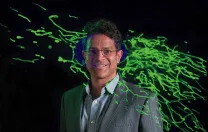Systems biology shares with physiology, a much older discipline, the desire to study how whole biological systems work and are integrated. In the 1930s, Harvard Medical School (HMS) professor of physiology Walter Cannon coined the term “homeostasis” to describe how the brain and various parts of the body talk to each other to maintain a stable internal equilibrium. “The limitation of that approach in the modern age,” explains Marc Kirschner, “is that most of the action is taking place at the molecular level.”
Kirschner, who founded the HMS department of systems biology in 2003 and chaired it until this spring, explains that, “whether in genetics, where mutated genes are expressed as proteins, or in pharmacology, where drugs (small molecules) interact with those proteins, the key interactions are at the microscale. Geneticists, cell biologists, and biochemists all work at this scale, but systems biology” is different because, like physiology, the field “aims to understand the dynamic interactions among components at that molecular level.”
Kirschner hired Mootha as the first faculty member for the new department in 2004. “What made Vamsi attractive,” he says, is that his field of study, metabolism, “is an integrated problem. It is not just figuring out what the pathways are, but how metabolism works to meet the constantly changing needs of the organism.” Mootha also brought an interdisciplinary approach to his focus on mitochondria, these machine-like systems that “influence, and are in turn influenced by, virtually every other part of the cell.”
Kirschner recalls that Mootha first used his background in mathematics to tease out the fingerprints of genetic changes that were important in diabetes. At the time, other researchers were finding genetic associations to diabetes that were not statistically reliable, he continues. Mootha “very cleverly grouped the changes in terms of systems. That increased their statistical significance, because he was looking at lots of associations, not just one thing at a time.” Mootha thus demonstrated the important role of mitochondria and oxidative metabolism in diabetes, and that “had a big impact,” Kirschner adds. Again and again, Mootha has used a blended approach to systems biology, combining the tools of genomics (he maintains an affiliation with the Broad Institute, where he co-directs the Metabolism Program) with direct measurements of variables such as oxygen uptake or calcium flux—the microphysiology that characterizes a greater proportion of the systems biology research taking place at HMS. Says Kirschner, “Vamsi is an absolute master at matching the approach to the system, and his work developing hypoxia as a treatment for mitochondrial disease is a beautiful example of using genomic tools to get at a physiological problem, with direct medical application.”









